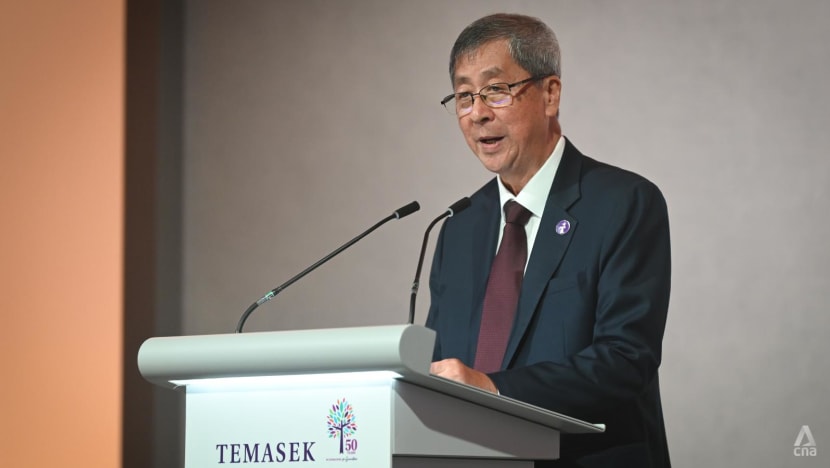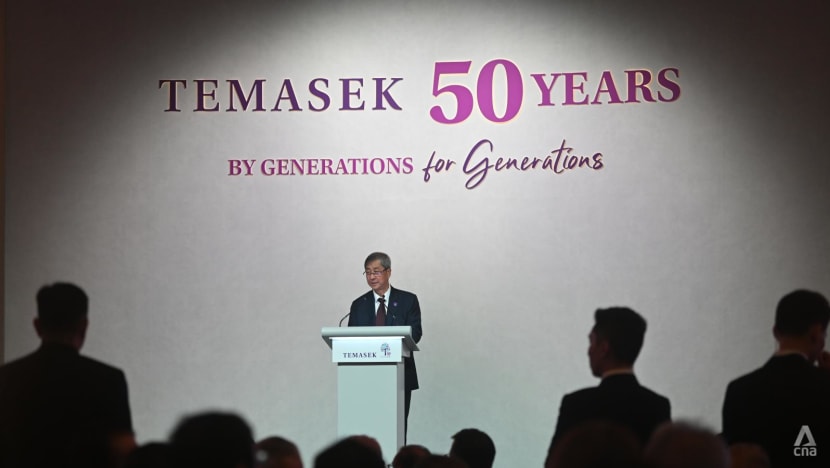Advertisement
The concessional capital will provide “more flexible, patient and favourable financing” to support marginally bankable projects that contribute to climate action, says Temasek’s chairman Lim Boon Heng.

Chairman of Temasek Lim Boon Heng announced Temasek’s commitment to set aside S$100 million as Concessional Capital for Climate Action (CCCA) during his speech at Temasek’s 50th anniversary dinner on Sep 23, 2024. (Photo: CNA/Syamil Sapari)
New: You can now listen to articles.

This audio is generated by an AI tool.
SINGAPORE: Temasek will set aside S$100 million (US$77.5 million) as concessional capital to support climate action initiatives, announced chairman Lim Boon Heng on Monday (Sep 23).
“The aim is to crowd in capital to support marginally bankable projects,” said Mr Lim at the state investor’s 50th anniversary dinner held at the Shangri-La Hotel.
“We believe there can be a catalytic effect by mobilising funding from other sources such as public, private and philanthropic capital providers. Our philanthropic dollar will be amplified as more funding goes towards climate action.”
This is the first time Temasek is contributing concessional capital – defined as a type of capital that is willing to absorb more risks or take a lower return – to drive the green transition.
The firm has been investing in sustainability – with a “sustainable living” portfolio valued at S$44 billion – but said it is seeing “the criticality of concessional capital to catalyse financing into emerging markets and developing economies” where the net-zero transition has been hindered by structural constraints and challenges.
Southeast Asia is one example where plans to decarbonise and build new industries concurrently will require the scaling of catalytic financing, it said.
Temasek added that its concessional capital will provide “more flexible, patient and favourable financing” that can address challenges such as emerging market risks and a higher cost of capital.
Success of its latest initiative will be measured by the “ability to scale positive outcomes in the area of climate action”.
These include the ability to avoid, mitigate and adapt to the impact of climate change, promote biodiversity and encourage sustainable living choices, among others, it said.
Temasek, which celebrates its 50th anniversary in 2024, has marked the year with other initiatives such as the set-up of a S$150 million fund for skills training and talent development in Singapore.
On Monday, it launched a commemorative book – titled “By Generations, For Generations: Fifty Years of Temasek As Told By The People Who Shaped It’’ – that captures the firm’s key events and milestones over the past five decades.
The book is written by former journalist Ong Soh Chin who interviewed about 90 staff, alumni and business partners.
Mr Lim, who has been chairman of Temasek since 2013, said the state investor has faced “countless dark clouds” since it was started in 1974 as a holding company for the government’s assets.

“We were a bold and unprecedented experiment. There was no map to follow and hardly a compass to help guide our way, Yet, charting our own course, we survived and thrived,” he said in a speech delivered to more than 600 guests gathered at the hotel, including Prime Minister Lawrence Wong.
Mr Lim highlighted three key themes that serve as key attributes and principles in guiding Temasek’s development into a global investment company with a portfolio value of S$389 billion.
The first is resilience, which he described as the ability to recover and adapt quickly to change.
This can be seen, for example, from how the state investor has built “a resilient and forward-looking portfolio to withstand turbulent market cycles”.
Purpose is another theme, said Mr Lim, noting that Temasek is not a company that focuses only on its financial numbers.
Since 2003, it has been setting aside a portion of its net positive returns above its risk-adjusted cost of capital for community gifts that meet the objectives of connecting people, uplifting communities, protecting planet, and advancing capabilities.
“I am happy to say that to date, Temasek’s gifts to Temasek Trust have had an impact on about 3.7 million lives across Singapore and beyond,” said Mr Lim.
Lastly, Temasek is focused on growth as can be seen from how it made the strategic decision in 2002 to expand beyond Singapore by investing into emerging Asia economies like China and India.
“In particular, we benefitted from our China exposure from the 2000s to the 2010s as China grew. This gave us the wherewithal to invest into other markets,” said Mr Lim.
Temasek then expanded into the United States and Europe in 2010, enabling the build-up of a more geographically-diversified investment portfolio.
This also saw an increase in staff count – from five staff members in a small office to 1,000 employees now spread across 13 offices in nine countries around the world.
Growth in returns is another key area for the investment firm, said Mr Lim.
“We recognise that high growth can also come with high risk. We make mistakes occasionally, but we learn from them,” he added.
In November 2022, Temasek said it would write off a US$275 million investment in bankrupt cryptocurrency exchange FTX. Following which, the state investor’s investment team and senior management “took collective accountability and had their compensation reduced”.
Mr Lim stressed the need for Temasek to “always stand ready to embrace the risks and possibilities, as well as the challenges and the opportunities of the world ahead”.
“Temasek is no ordinary company. Nor can it be. Just like Singapore, our survival lies in us being bold and extraordinary,” he said.

































